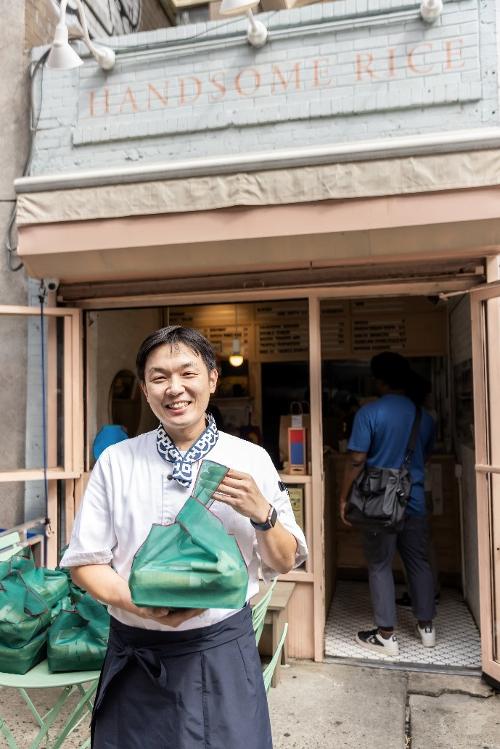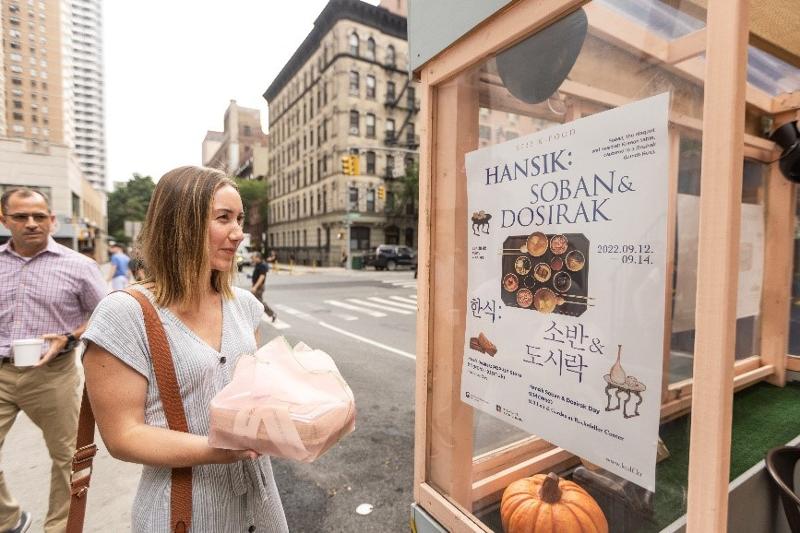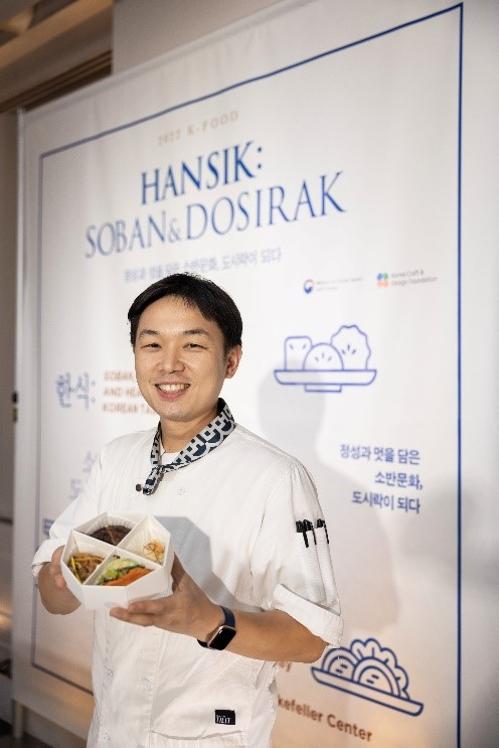
Chef Kim Han-song is the owner of Handsome Rice, a dosirak (packed meal) restaurant that he opened in 2018 in the Manhattan district of New York.
By Yoo Yeon Gyeong of Korea.net and Kang Sung-chul of Yonhap News
Photos = Kim Han-song
"To maintain the momentum of the globalization of Korean food, we must stay true to the basics of localizing ingredients."
Chef Kim Han-song, 40, a certified examiner of the American Culinary Federation (ACF), runs Korean restaurants in New York and New Jersey. He is as passionate about sharing the history of ingredients and food culture as he is about making food.
In a Dec. 6 joint interview with Korea.net and Yonhap News, he stressed the importance of choosing the proper ingredients.
"Even if you make kimchi under the same method, the taste will differ depending on the cabbage, pepper and garlic used," he said. "Differences will widen if the country of origin isn't the same, so Korean food can truly shine only if made with our ingredients."
Winning more than 20 Hansik (traditional food) cooking competitions in Korea and authoring seven books on food and food culture, Kim was a star chef in Korea. As a celebrity from his late 20s, he hosted Olive TV's show "Tasty Road 2" and appeared in the LG Electronics' mobile phone Oz commercial, but decided to study in the U.S. from 2011 in taking on a new challenge.
After completing a master's degree in hospitality at Johnson & Wales University in Rhode Island, where he studied general culinary, hotel and restaurant management, he became the first Korean to earn the designations of certified executive chef and approved certified evaluator from the ACF, North America's oldest and most respected culinary organization.
His goal in the U.S., at the cost of giving up a guaranteed future in Korea as a chef, was to spread Korean cuisine.
Over a decade since he moved to the U.S., Kim runs Handsome Rice, a dosirak (packed meal) hot spot in Manhattan, where all of the world's flavors compete, and Seoul Fried Chicken in New Jersey.
Opened in 2018, Handsome Rice was named one of the top three lunch spots in Manhattan by The New York Times and Fox News and spread throughout the U.S. For the following 1 1/2 months, the store was said to have had customers lining up from morning to night as Kim achieved his goal of delivering the comfort of Korean food, with its warm white rice, bulgogi (marinated grilled beef), galbi (grilled ribs), jaeyuk bokeum (stir-fried spicy pork) and namul (seasoned herbs) to the Big Apple through packed meals.
The following are excerpts from the interview, in which the chef discusses how the globalization of Korean food can truly succeed only if the Hansik craze also benefits Korean farmers.

A customer receives a dosirak (packed meal) during the campaign "Hansik: Soban & Dosirak" from Sept. 12-14, 2022, hosted by the Ministry of Culture, Sports, and Tourism and Korea Craft and Design Foundation in New York's Manhattan district.
What drives you to promote Korean cuisine as well as run Korean restaurants?
I was best at making Korean food, so I wanted to share both the experience and culture. Not just eating it, but enjoying it with your eyes and ears and presenting Korean culture make it feel more familiar. It's great for a chef to succeed in business, but I think there are some things more important than money. I feel that proudly working as a Korean chef abroad shines my light brighter. This is what motivates me to work harder.
Describe your project for improving public school lunches in the U.S. using Hansik.
We promote the K-Food Revolution Project, which introduces school lunches comprising Korean dishes that match American tastes and are nutritious and healthy. The appeal of Korean food is endless. In the U.S., where people of all ethnic backgrounds live, we're developing meals focused on "vegetarian foods" that anyone can enjoy. Specifically, our menu features healthy and delicious namul, fruit and grain to provide meals such as ssambap (vegetable wraps), vegan japchae (stir-fried glass noodles), tofu and nuts.
The goal is to instill at public schools, which are often overrun with instant and obesity-causing lunches, a positive image of Korean food in youth while improving their health. We will start with programs at pilot schools by signing agreements with consultative bodies like the Senate and House of Representatives of both New York and New Jersey, city and local councils, and civic and parent organizations, with the eventual goal of expanding into a nationwide campaign.

Chef Kim Han-song shows a dosirak (lunch box) featuring the leading Korean holiday dishes ssambap, japchae, tteokgalbi (grilled short-rib patties), jeon (pancake) and baek (white) kimchi at the event "Hansik: Soban & Dosirak" from Sept. 12-14, 2022, run by the Ministry of Culture, Sports, and Tourism and Korea Craft and Design Foundation in New York's Manhattan district.
Your recent publication "Eating New York" stresses the importance of ingredients and food culture. Name your favorite Korean ingredients and food culture.
A chef needs deep understanding of ingredients and food culture as much as culinary skills. This is because proper understanding of ingredients naturally leads to learning how to cook with them. I love Korean herbs, which are hard to find elsewhere worldwide because they grow deep in mountains and fresh water. In the U.S., a multicultural and multiracial country, Korean herbs are a vegetarian option everyone can enjoy and part of Korean food and culture appealing without objection by salt content-conscious Americans.
What is the most important part of Korean food's globalization under the Hallyu craze?
The response to Korean food has recently been exceptionally hot not only in the U.S. but globally. The globalization of Korean food has reached a certain point. We shouldn't just focus on promotion. For people worldwide to keep loving Korean food, Korea's farmers and food companies making the ingredients should be the first to benefit from the Hansik craze. To this end, we need to set up infrastructure to support the overseas advance of ingredients and food products made in Korea.
What is your most important value in life?
Sharing. My dream is to become a social activist through cooking. Spanish American chef Jose Andres founded World Central Kitchen, a relief organization that provides charity in the event of conflict or disaster such as the war in Ukraine or earthquake in Haiti. The group is non-political and focused only on helping those in need. Chef Andres is so influential that when he visits relief sites, many global food companies sponsor his activities. As a Korean chef, my dream in the distant future is to launch a relief organization using Korean food.
How will you improve public school lunches in the U.S. through Korean food?
I seek to advance my project to improve lunches at public schools to the world. For this, I am promoting progress in the venture through programs airing on internet-based platforms like Netflix. I also want to collaborate with many people to make this initiative a reality. While my initial focus is on the U.S., I plan to take the leading in improving school meals worldwide.
dusrud21@korea.kr